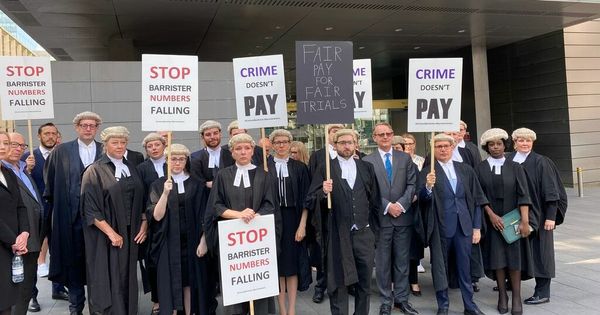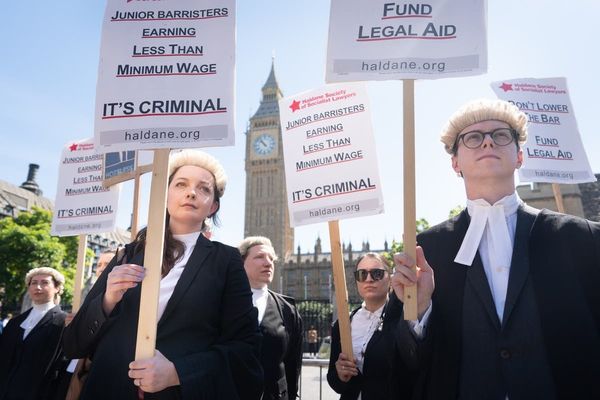
Barristers are heading to parliament as they begin their first whole week of strike action over levels of legal aid funding they say are bringing the criminal justice system to its knees.
Members of the Criminal Bar Association, which represents advocates in England and Wales, began action with a two-day strike at the end of last month and have been escalating it by an extra day every week.
If a deal is not agreed with the government criminal barristers will stage five-day walkouts every other week from now on.
Jo Sidhu QC, CBA chair, said: “We bring our action for justice to the heart of parliament as those MPs who represent us all, need to hear from those of us who prosecute and defend on behalf of the voiceless – in particular the victims of crime left to suffer and languish by government’s ongoing failure to stem the massive exodus of criminal barristers.
“The great levelling up agenda will be strangled at birth without government properly funding legal aid to ensure that we have enough prosecutors and defenders dealing with the unprecedented backlog of 58,000 cases. Without proper funding there can be no diversity at the criminal bar and our judiciary will end up deprived of the talent of hundreds of women and minorities from ordinary backgrounds who have devoted their professional lives to the service of the public in our criminal courts.”
The Ministry of Justice has agreed to a 15% uplift in fees – the minimum recommended by an independent review – to new instructions beginning from the end of September but is refusing to apply it to existing cases. Given barristers are only paid at the conclusion of trials and the size of the backlog, they could be waiting years before seeing the increased fees.
The CBA says there has been a 28% cut in criminal legal aid fees in the past decade and is demanding a 25% increase.
A delegation of barristers will meet MPs at parliament in a committee room on Monday before being followed by other CBA members who will attempt to speak to their respective MPs.
James Oliveira-Agnew, a state school educated barrister who used to be a forklift driver, said it was a struggle for him when he was called to the bar in 2008 but it is much worse now, given the median income for the first three years of criminal practice is £12,200.
“We’re going to go and we’re going to see if we can speak to the MPs and see what we can get,” he said. “We’re going to show them that this is our group of people, this is who we’ve got, people from every walk of life, every background, every diversity, every ethnicity, and if they want to keep that, and if they want this system to keep going, it can’t run on our goodwill, it has to run on payment and funding.”
The justice secretary, Dominic Raab, has described the CBA action as “regrettable”, saying it would delay justice for victims. He has said the 15% increase means a “typical barrister” would earn an extra £7,000 a year.










